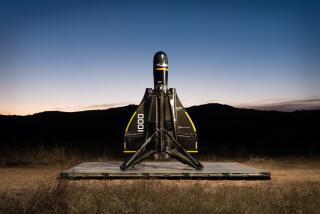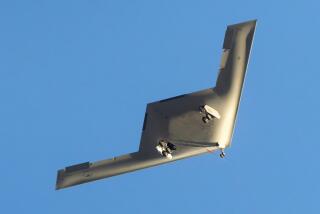Raytheon develops 13-pound ‘smart bomb’ for drone aircraft [Video]
LAS VEGAS -- When it comes to munitions, Raytheon Co. usually thinks big.
Multi-ton bunker-busting bombs. Jet engine-powered cruise missiles. GPS-guided 500-pound bombs.
Now the Waltham, Mass., defense giant believes it has something small to offer.
After developing a 13.5-pound “smart bomb” for four years, Raytheon has carried out a successful test flight at the Army’s Yuma Proving Ground in Arizona. The bomb, called Pyros, was dropped from a drone flying at 7,000 feet and hit the designated bull’s-eye on a target that lay below.
The target had two dummies, which simulated insurgents planting an improvised explosive device. (See in the video below.)
“It went right through the center of the target board,” said J.R. Smith, a company business development manager. “We demonstrated everything works end to end.”
Raytheon revealed Pyros’ capabilities Tuesday at the Assn. for Unmanned Vehicle Systems International trade show in Las Vegas, where hundreds of robot makers have gathered to show off their wares.
Raytheon’s idea is that the small bomb could be slung under a small drone’s wing, be dropped to a specific point using GPS coordinates or a laser-guidance system, and blast apart “soft” targets -- such as pickup trucks and people -- below.
Raytheon does not have a contract for the bomb and is building it entirely with its own money. But the company said there is plenty of demand.
Marines in Afghanistan have said there is urgent need for a weapon that is small and powerful enough to protect them from insurgents planting roadside bombs. Marines already have small spy drones with high-powered cameras. What they want is a way to destroy the enemies that their drones discover.
“Those guys don’t necessarily need a 500-pound bomb to take out the whole block,” Smith said. “They need something small and precise.”
The nearly 2-foot-long Pyros bomb is steered by a GPS-guided system made by L-3 Interstate Electronics Corp. in Anaheim.
Pyros could also be used on larger robotic aircraft, such as the lethal Predator and Reaper drones that are currently deployed and typically carry 100-pound laser-guided Hellfire missiles or 500-pound GPS-guided smart bombs.
“You could put 12 of these small bombs on a Predator,” Smith said. “It would be especially useful in a target-rich environment.”
In the 21st century, the Pentagon is increasingly looking to cheaper, smaller weapons to wage war.
ALSO:
Rocketdyne sold to GenCorp for $550 million
Daredevil jumps from 96,640 feet as part of record-breaking mission
Drone manufacturers are urging the U.S. to let them sell more overseas
Follow W.J. Hennigan on Twitter or Google+
More to Read
Inside the business of entertainment
The Wide Shot brings you news, analysis and insights on everything from streaming wars to production — and what it all means for the future.
You may occasionally receive promotional content from the Los Angeles Times.











